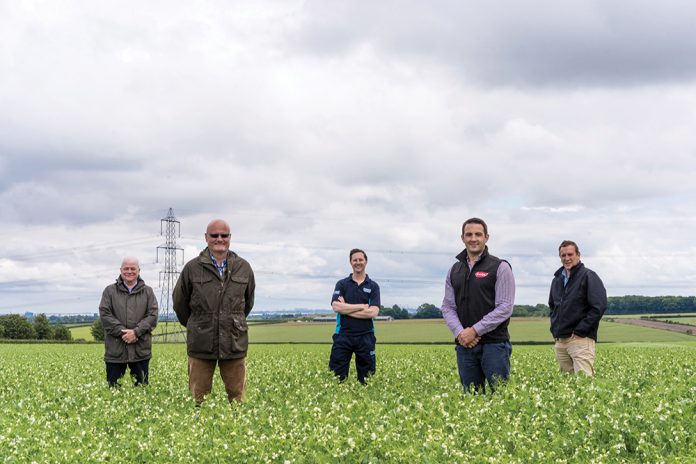More than 40 farmers in East Yorkshire and North Lincolnshire are taking part in a landmark project that could help return atmospheric CO2 to pre-industrial levels, reduce flooding and improve soil health.
The Sustainable Landscapes Humber Project – a collaboration between Yorkshire Water, Nomad Foods-owned Birds Eye, Future Food Solutions and Hull and Teesside universities – will see farmers growing cover crops between harvesting and sowing.
Known as pop up rainforests, the diverse range of cover crops can capture huge amounts of CO2 from the atmosphere. Trials have shown the plants can also increase soil organic matter by up to 40 tonnes per hectare, which can sequester nett over four tonnes of atmospheric carbon per year.
As soil organic matter has fallen by 50% over the past 60 years, using cover crops to restore these levels not only has the potential to re-establish soil health, but could also help contribute to reversing the ongoing rise in atmospheric CO2 levels.
The pre-project trials have already achieved a dramatic rise in soil organic matter, more than doubling levels in just five years, from 3% to over 6%.
Andrew Walker, asset strategy manager for Yorkshire Water, said: “Growing cover crops to increase soil organic matter is one of the most effective way of combatting the major environmental issues we face today.
“In just seven weeks, they generate enough carbon-sequestering organic material to make a significant dent in atmospheric CO2.
“If grown on a global scale, arable farming could become the first sector of the economy to be net carbon zero.”
He added that the Sustainable Landscapes Humber Project could also play a major role in the reduction of flooding in Hull.
Yorkshire Water is a core partner in the Living With Water partnership in the city, alongside East Riding of Yorkshire Council, Hull City Council and the Environment Agency.
“The remit of the Living With Water partnership is to implement measures that reduce or mitigate the impacts flooding has on Hull,” Mr Walker said.
“Research shows that achieving just a 1% increase in soil organic matter would enable agricultural land to store an extra 200,000 litres of water per hectare.
“Therefore, this project has huge implications for flood attenuation in and around Hull. Birds Eye has long term relationships and collaborations with its growers, so by working with them to increase the levels of soil organic matter in the Humber region, we can make a real impact.”
Paul Rhodes, director of Future Food Solutions, added: “The plants’ root structure holds the topsoil in place reducing erosion, and the increase in organic matter means less farm inputs are required, enabling farmers to grow food more efficiently and profitably.
“Of the inputs that are required, less are leached away into the waterways, making for healthier rivers and watercourses and this has a positive knock on effect on local flora and fauna.”
Fellow Future Food Solutions director, Steve Cann, described launching the Sustainable Landscapes Humber Project as a great example of collaboration between utility partners, the supply chain and farmers, and this was just the start with the initiative set to grow as new crops are drilled.
He said: “Because of the unique nature of the Birds Eye supply chain and interactions with the growers of the Green Pea company, peas can be the catalyst for change; the same farmers will grow wheat, barley and oil seed rape for other supply chain partners so the potential to upscale the project is huge.
“As further crops come into play, we expect to see more food brands coming on board and more farmers starting to grow cover crops as the benefits become clear. This hugely exciting project is set to grow and grow.”
James Young, Agriculture and Veg Sourcing Director, Nomad Foods said: “We have a rich history in the Humber catchment area, having worked with local farmers for over 60 years growing highest quality peas for our consumers.
“Sustainable agriculture is at the heart of our company purpose at Nomad, and has always been at the core of the partnership with these farmers.
“Therefore, we’re very excited to be involved in this project and the opportunity to work collaboratively with partners on finding solutions to issues such as climate change and flooding, as well as improving soil health for future crop production.”
Soil organic matter, water content and other metrics will be monitored by the University of Hull on an ongoing basis.
Professor Dan Parsons, director of the Energy and Environment Institute at the University of Hull, said: “We are delighted that this project is underway, with a range of excellent partners brought together by Future Food Solutions and linking to the THYME programme, a £5m project funded by the Research England Connecting Capabilities Fund.
“The government’s 25-year environment plan speaks of maximising natural capital and working with nature in our use of landscapes. The Sustainable Landscapes Humber Project is an exemplar of how we can optimise landscape use to amplify ecosystem services, such as bio-diversity and reducing flood risk, whilst also maintaining or improving agricultural crop values into the future.
“The innovative practice that will be demonstrated by the project, through digitalisation and high-resolution monitoring and modelling, holds great promise in shaping our use, management and interactions with landscapes into the future.”



